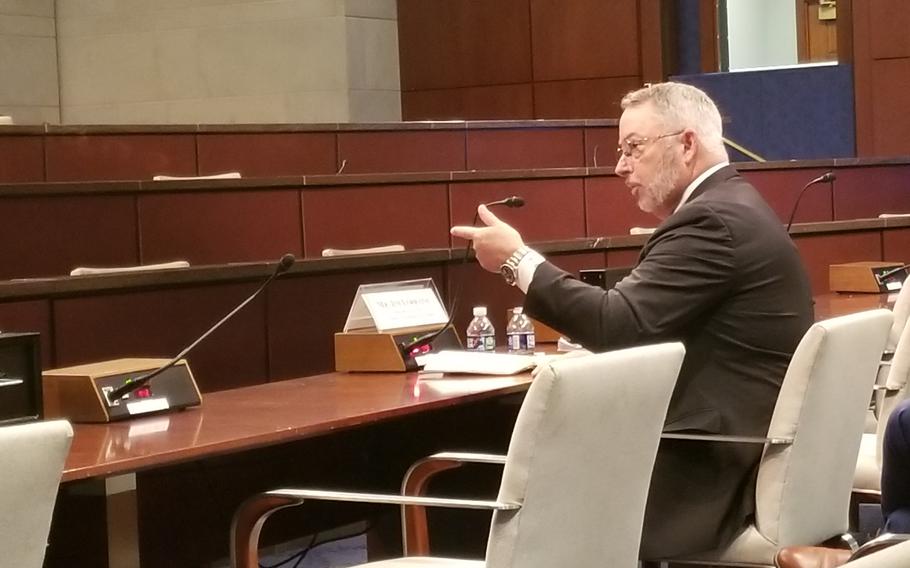.jpg/alternates/LANDSCAPE_910/651873%201.jpg)
Leaders of the America’s Warrior Partnership on Thursday, Sept. 29, 2022, challenged the accuracy of a recent veteran suicide report from the Department of Veterans Affairs during a House Veterans’ Affairs Committee hearing. (Getty Images/iStockphoto)
WASHINGTON — An organization that challenged the accuracy of a recent veteran suicide report from the Department of Veterans Affairs told House lawmakers on Thursday that the agency’s data is missing a key piece: the veteran's experience with the VA’s health and benefits administrations.
Jim Lorraine, an Air Force veteran and president of America's Warrior Partnership, said his organization examined a veteran’s military service and death certificate when compiling the data for the group’s own veterans suicide report released nearly two weeks ago. However, his organization does not have the middle piece, which is the veteran’s VA experience with the agency’s benefits and health administrations such as the VA home loan program.
“[That information would] be critical,” Lorraine told House Veterans’ Affairs Committee members. “We could get a really good longitudinal picture from the time they began their service to the time they died.”
America's Warrior Partnership released its study called Operation Deep Dive a few days before the VA issued its veteran suicide report Sept. 19. The study found a 37% higher rate of veteran suicides than the VA reported previously.
Lorraine said last week that the VA's methodology was dated. His group’s study examined suicides and "self-injury mortality,” or deaths classified as accidental or undetermined, in people aged 18 to 64 from 2014 to 2018. The group used service records from the Defense Department and death records from eight states.
At the hearing Thursday, Lorraine said the VA must be more open and transparent about their data and share it with researchers as mandated by Congress.

Jim Lorraine, an Air Force veteran and president of America’s Warrior Partnership, testifies Thursday, Sept. 29, 2022, at a House Veterans’ Affairs Committee hearing. Lorraine’s organization is grant recipient of one of the Department of Veteran Affairs’ initiatives designed to combat veteran suicide. (Sara Samora/Stars and Stripes)
“The VA’s numbers and methods and how they are used is not clear, and the VA has not been open to sharing data despite the efforts of other organizations and ourselves,” he said.
Lorraine also urged the VA to further investigate self-injury mortality – such as opioid overdose – and include it in its reporting.
America’s Warrior Partnership, a suicide prevention group, contracted with the University of Alabama and partnered with Duke University to gather state-provided death data for its study. The group also coordinated with the Defense Department to corroborate military affiliation. Researchers for the study, which was funded by the Bristol Myers Squibb Foundation, worked to get the specificity of each decedent’s demographics, military experience and death details.
The VA’s annual report on veteran suicide prevention compiles its data on a two-year lag. The report found there were 6,146 veteran suicide deaths in 2020, 343 fewer than in 2019. The average number of veteran suicides in a year also had a small decrease, from 17.2 in 2019 to 16.8 in 2020.
Tamara Campbell, interim executive director at VA's Office of Mental Health and Suicide Prevention, told House Veterans’ Affairs Committee members that the agency’s methodology for generating the report is based on verified data from the Centers for Disease Control and Prevention and Defense Department.
“Our reports in scientifically rigorous [and] evidence-based, using the methodology as you would for a peer-reviewed publication,” she said.
Matthew Miller, national director of suicide prevention at VA’s Office of Mental Health and Suicide Prevention, said he is 100% confident that the agency’s suicide data represents the most accurate information on veteran suicide.
Campbell and Miller said they did not agree with America's Warrior Partnership’s report. Miller also said the group’s report offers a comparison of apples to oranges.
“The definition of ‘former service member’ is not comprehensively presented within their report, nor match to the data,” he said. “Our definition of veteran and where it comes from is specifically mentioned in our report and in our methodology section.”
Lorraine said the organization looks at a veteran’s full career, so they know who served, who went into the Reserve, and who was on active duty.
America’s Warrior Partnership is a grant recipient of one of the VA’s initiatives designed to combat veteran suicide, The Staff Sergeant Parker Gordon Fox Suicide Prevention Grant Program. The grant program is designed to help meet the needs of veterans and their families through outreach, suicide prevention services, and the VA and its community resources. The VA announced it will fund more than $52 million to 80 community-based organizations in 43 states, the District of Columbia, and American Samoa.
The program is named after Army veteran Parker Gordon Fox, who joined the Army in 2014 and was a sniper instructor at the Army Infantry School at Fort Benning, Ga. Fox died by suicide on July 21, 2020. He was 25.
In October, Sens. Jon Tester, D-Mont., and Jerry Moran, R-Kan., the chairman and ranking Republican of the Senate Veterans’ Affairs Committee, respectively, sent a letter to VA Secretary Denis McDonough urging the agency to collaborate with America’s Warrior Partnership study. The senators also inquired about the agency’s veteran suicide data collection methods.
McDonough sent a letter in response to Moran at the beginning of the year. In the letter dated Jan. 13., McDonough wrote the Operation Deep Dive team requested in 2021 that the agency indicate whether the veterans identified in the study had received VA services.
McDonough wrote in the letter that VA data and privacy officials would need to review the materials before the information could be shared outside the agency.